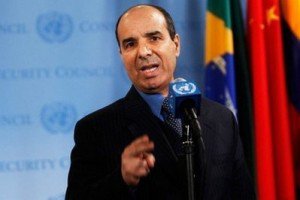By Libya Herald reporter.

Tripoli, 10 November 2015:
Libya’s UN ambassador Ibrahim Dabbashi has accused the British and American intelligence services of hacking . . .[restrict]the emails of outgoing UN Special Envoy Bernardino Leon and then leaking them to the British newspaper, the Guardian.
Last week, it published a report that Leon was negotiating his new job as head of the UAE’s diplomatic academy while trying to mediate a settlement in which the Emiratis supported one side in the divide. Part of the allegations against Leon were based on an email last December from him to the UAE’s foreign minister Abdullah bin Zayed al-Nahyan.
“The Guardian newspaper is very close to British intelligence,” Dabbashi said on social media, “and Leon’s emails could only have been leaked by the British external intelligence service, MI6.”
The aim, he claimed, was not to embarrass Leon but send a message to his successor, Martin Kobler, to ensure he carried out their wishes. These, he said, had been rejected by Leon because “he was committed to the position of the Security Council and the United Nations that the House of Representatives is the sole legitimate authority in Libya”.
Accusing the British and American of colluding with Libya Dawn in its attack on the oil terminals in Sidra and Ras Lanuf last December, he claimed that London and Washington wanted “to continue the chaos that grants the opportunity to their citizens of Libyan origin to govern Libya or the mini-states that would result from the division of Libya”.
The “citizens of Libya origin” is seen in particular as a reference to Abdurrahman Sewehli.
Dabbashi also accused the two countries of not being serious about the fight against terrorism.
Leon, on the other hand, had “understood the complexities of the Libyan situation, and was committed to UN rules”. He had “bravely opposed” their plans to bypass “legitimate institutions” andto include “militants including some extremists” in the new government.
He also dragged Leon’s predecessor as UN Special Envoy to Libya, Tarek Mitri, into his attack, noting that he had been a board member of the Arab Center for Research and Policy Studies in Qatar while working in Libya. Why, he asked in his defence of Leon, had the Guardian not mentioned this.
The attack has provoked an angry response from Mitri on Twitter, pointing out that he had disclosed his membership of the board prior to his appointment as special envoy and that it had been cleared by the UN. In one tweet, he said that the UN’s credibility was now “at stake”.
While Dabbashi sees MI6 and the CIA as responsible for leaking the email to the Guardian, others inside and outside Libya take the view that Qatar was responsible. [/restrict]









